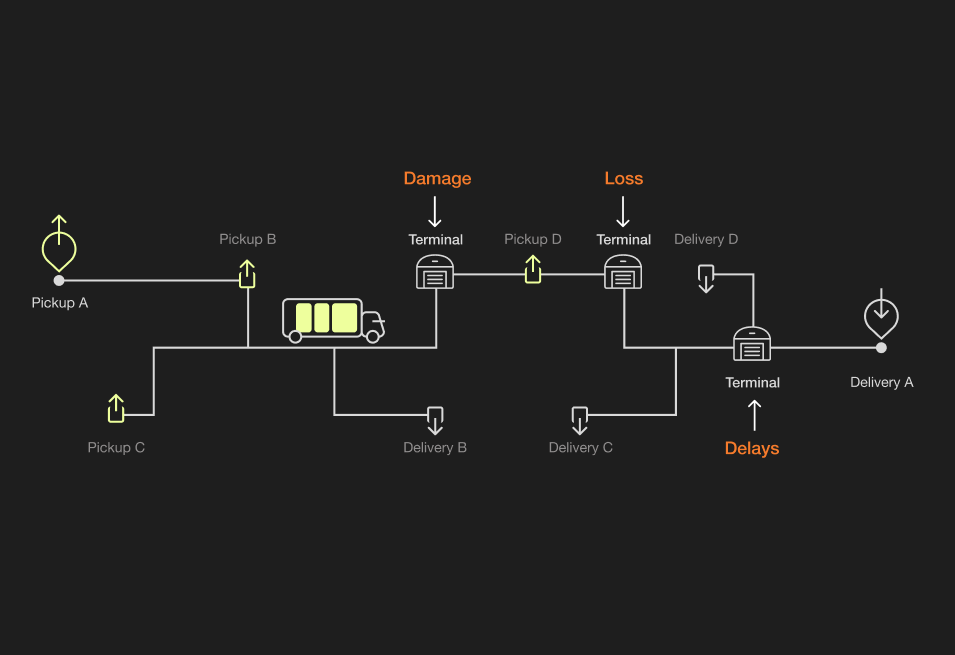FOB Freight Shipping

What does FOB mean for freight shippers?
Freight shipping is a fast-paced and often unforgiving space. It’s a go, go, go environment where shippers live and die by their timelines. With that said, you might not always have time to do a deep-dive on important designations or terms. You’ve got freight to ship, after all. One of the most ubiquitous and misunderstood terms in freight shipping is the acronym “FOB.” What does FOB mean, anyway? Depending on who you ask, the term stands for “free on board” or “freight on board.” It’s present on paperwork, the bill of lading, terms of sale, invoices, and more—it’s an essential part of shipping paperwork, but many people in the shipping industry are unclear on what it actually means. Knowledge is power. When you understand the nuances behind shipping terms like FOB, it will not only make complex paperwork easier to understand, but can help you better process freight claims and minimize liability.
What is FOB?

FOB is an important acronym used in everything from domestic to international shipping. It’s a dated term that shippers used to refer to transferring freight from trains to seaports. It's old-timey, but the word stuck. FOB determines when a shipper and when a buyer are liable for freight. This covers who pays for the cost of delivering that freight, as well as who’s liable for damages, should anything happen to the freight. Put simply, shippers use FOB to determine when they’re responsible for shipping costs. This also refers to costs for transport, loading, marine freight, unloading, and insurance. Keep in mind that the FOB doesn’t assign ownership of the goods. It’s talking about liability for the cargo, not who owns it. FOB is for determining who pays freight costs and covers damages, and at what point. The FOB is going to look different depending on the terms of your agreement. In an ideal world, the FOB has the shipper pay to transport everything until the freight reaches the port. From there, the buyer pays to transport it from the port to their store or warehouse. But real life isn’t so clear-cut. FOB shipping comes with a variety of terms detailing the specifics of the FOB arrangement. Familiarize yourself with these four FOB terms so you're always in the loop.
1. FOB origin

If you’re shipping freight from Dallas, the FOB would say “FOB Dallas.” That means the seller (AKA the shipper) is responsible for transporting freight to port and paying to unload it. From that point on, the buyer takes over the costs and liability.
2. FOB destination
But what if you’re shipping goods from, say, China to Los Angeles? Your FOB would say “FOB Los Angeles.” This means the buyer (like Amazon or Walmart, for example) is responsible for paying the costs or damages.
3. Freight collect

The next two designations concern who is paying for the freight costs and at what point. If the FOB says “FOB Collect,” that tells the port of shipment to “collect” freight costs from the buyer before proceeding to ship the freight. In plain English, that means the person receiving the shipment from the seller is responsible for freight charges from that point on.
4. Freight Prepaid
But if you’re a seller who’s pre-paid for the whole shebang, the FOB would say “FOB Pre-paid.” If a buyer orders products from your Chinese manufacturing plant, it would be “FOB Pre-paid” if you cover the transportation costs to ship that freight to its final destination.
Why does this matter?

Why should shippers and carriers focus on FOB, anyway? It boils down to two things.
1. Remove ambiguity
Shipping is hard enough. Procedural confusion can make your operation 2,000 times more stressful. FOB removes ambiguity from the situation. It says who is paying for what and when, so you always know what you’re on the hook for.
2. Assess damage claims efficiently
In the event of freight damages, you’ll know if you should process with your insurance or if the buyer needs to do so. The FOB spells out in black and white who has control of the goods, saving you the hassle and back and forth. This helps you minimize liability and save money.
Simplify the complex world of freight shipping
Time is money in the world of shipping. You don’t need to waste time scratching your head over paperwork. It’s time to simplify your workload. That’s why shippers choose FlockDirect™️, our shared truckload (STL) service.The shared truckload approach enables shippers to deliver damage-free loads on time. With STL service, shippers share the deck space and cost of a full-size trailer and guarantee the efficiency of TL service in one fell swoop. Because shipments never leave the truck until delivery, they arrive intact and on time. For shippers, the shared truckload mode ultimately means TL service at a better rate. Flock Freight® is the only logistics provider that guarantees STL service at the point of sale through FlockDirect.





